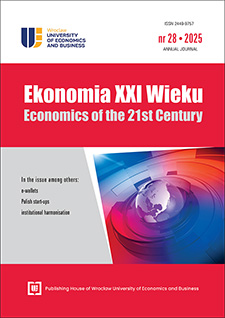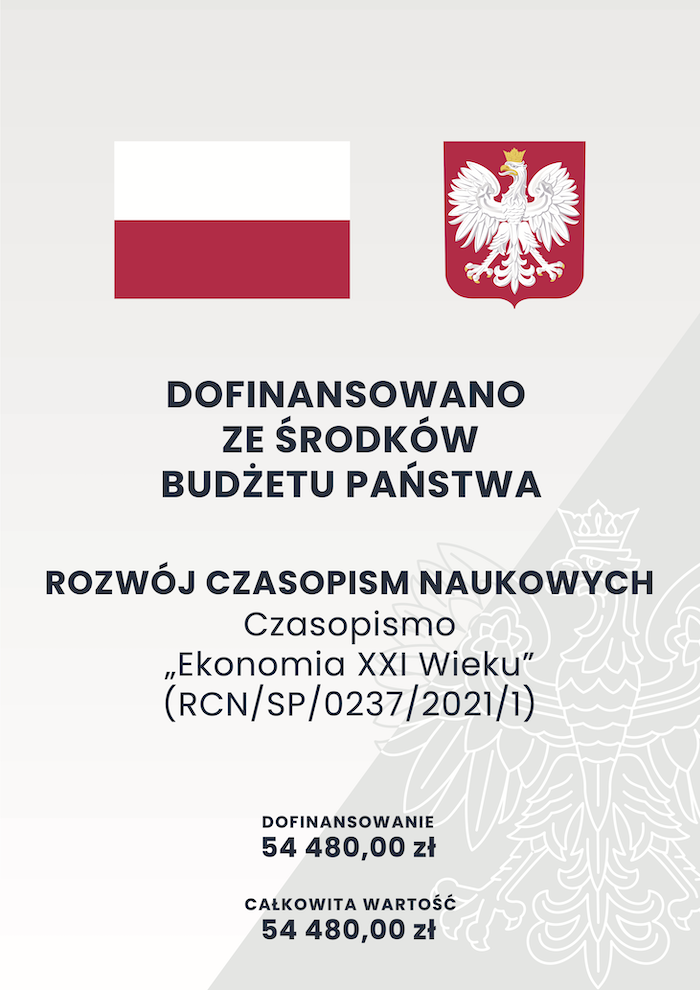Kobiecy wymiar cyfrowego nomadyzmu: jakościowa analiza doświadczeń cyfrowych nomadek
DOI:
https://doi.org/10.15611/e21.2025.05Słowa kluczowe:
cyfrowy nomadyzm, cyfrowi nomadzi, marketing miejscAbstrakt
Cel: Artykuł ma na celu przedstawienie zalet i wad cyfrowego nomadyzmu z perspektywy kobiet. W części teoretycznej zaprezentowano definicje cyfrowego nomadyzmu jako globalnego trendu i korzyści z pozyskania tej jednej z najnowszych grup docelowych przez jednostki terytorialne. Wnioski z przeprowadzonego badania związane są z obszarem marketingu terytorialnego, a w szczególności służą wsparciu lokalnych zarządców w tworzeniu odpowiednich miejsc docelowych dla mobilnych pracowników.
Metodyka: Zastosowano podejście jakościowe przy wykorzystaniu narzędzia w postaci kwestionariusza wywiadu ustrukturyzowanego. W badaniu wzięło udział 12 kobiet, które w czasie badania aktywnie prowadziły nomadyczny tryb życia w różnych częściach świata.
Wyniki: Do najczęściej wskazywanych przez respondentki zalet nomadycznego stylu życia należą wolność i mobilność. Badane kobiety szczególnie cenią sobie poczucie autonomii w decydowaniu, kiedy i gdzie pracują. Odnośnie do najczęściej wymienianych wad uczestnicy badania wspomnieli o poczuciu samotności i trudnościach w utrzymywaniu relacji przy częstej zmianie miejsca zamieszkania.
Implikacje i rekomendacje: Badania pozwalają na lepsze zrozumienie szans, wyzwań i potrzeb kobiet związanych z ich mobilnym stylem życia. Wnioski z badań kierowane są głównie do władz jednostek terytorialnych. Implikacje te dotyczą marketingu terytorialnego i mogą wspierać przyciąganie cyfrowych nomadów do określonych destynacji.
Oryginalność/wartość: Wartość badania może być potwierdzona faktem, że dotychczas tylko w dwóch artykułach naukowych na świecie zwrócono uwagę na kobiecą perspektywę cyfrowego nomadyzmu. Według statystyk coraz więcej kobiet decyduje się na realizację obowiązków zawodowych w tym trybie. Biorąc pod uwagę rosnący odsetek kobiet wśród cyfrowych nomadów, wyniki badań rzucają światło na kwestię lepszego dostosowania miejsc docelowych do ich pobytu.
Pobrania
Bibliografia
Almeida, M. A., de, Correia, A., Schneider, D., & Souza, J. M., de. (2021, May 5-7). COVID-19 as an Opportunity to Test a Digital Nomad Lifestyle. In 2021 IEEE 24th International Conference on Computer Supported Cooperative Work in Design (CSCWD) (pp. 1209-1214).
Basaran, A. (2025). Digital Nomads, the New Frontier of Work in the Digital Age: A Bibliometric Analysis. Sustainability, 17(5), 1906.
Basu, M. (2024). Tech-driven Horizons: Pioneering Sustainable Tourism for Environmental Resilience and SDGs Triumph. In P. Singh, S. Daga, K. Yadav, & A. Jain (Eds.), The Need for Sustainable Tourism in an Era of Global Climate Change: Pathway to a Greener Future (pp. 215-247). Emerald Group Publishing.
Beaumont, J. (2019). Digital Nomads and Sense of Place: A Case Study of Lisbon. Wageningen University.
Bednorz, J. (2024). Working from Anywhere? Work from Here! Approaches to Attract Digital Nomads. Annals of Tourism Research, 105, 103715.
Boddy, C. R. (2016). Sample Size for Qualitative Research. Qualitative Market Research: An International Journal, 19(4), 426-432.
Bonneau, C., & Aroles, J. (2021). Digital Nomads: A New Form of Leisure Class? In J. Aroles, F.-X. de Vaujany, & K. Dale (Eds.), Experiencing the New World of Work (pp. 157-177). Cambridge University Press.
Bozzi, A. (2024). Digital Nomadism from the Perspective of Places and Mobilities: A Literature Review. European Transport Research Review, 16(1), 11-15.
Chen, L. (2025). Gender Dynamics in Remote Work Communities: A Protocol on Understanding the Challenges and Opportunities for Female Digital Nomad Online Language Tutors. International Journal of Qualitative Methods, 24.
Chevtaeva, E. (2021). Coworking and Coliving: The Attraction for Digital Nomad Tourists. In W. Wörndl, C. Koo, & J. L. Stienmetz (Eds.), Information and Communication Technologies in Tourism. Proceedings of the ENTER 2021 eTourism Conference, January 19-22, 2021 (pp. 202-209). Springer.
Erkic, A. (2025). Digital Nomad Statistics for 2025. Pumble. Retrieved 12 June 2025 from https://pumble.com/learn/digital-nomad-visa/statistics/
Genceli, D. Y., Yüksek, G., & Uca, S. (2024). Travel Insurance Behaviors of Digital Nomads. Worldwide Hospitality and Tourism Themes, 16(3), 365-374.
Glinka, B., & Czakon, W. (2021). Podstawy badań jakościowych. Polskie Wydawnictwo Ekonomiczne.
Green, P. (2020). Disruptions of Self, Place and Mobility: Digital Nomads in Chiang Mai, Thailand. Mobilities, 15(3), 431-445.
Günay, F., Toksöz, D., & Aslan, Z. (2024). The Causes, Process and Result of Becoming a Digital Nomad Family: A Phenomenological Case Study. Worldwide Hospitality and Tourism Themes, 16(3), 294-302.
Johnson, C. (2024). Digital Nomads Move from Niche to Normal with 18.1M Workers. Staffing Industry Analysts. Retrieved 12 June 2025 from https://www.staffingindustry.com/news/global-daily-news/digital-nomads-move-from-niche-to-normal-with-181m-workers
Kvale, S. (2010). Prowadzenie wywiadów. Wydawnictwo Naukowe PWN.
Lacárcel, S., Huete, R., & Zerva, K. (2024). Decoding Digital Nomad Destination Decisions through User-generated Content. Technological Forecasting and Social Change, 200, 123098.
Lhakard, P. (2022). Destination City for Digital Nomads in Thailand: A Case Study of the Digital Nomad Community in Chiang Mai. Journal of Humanities and Social Sciences Studies, 4(1), 178188.
Liegl, M. (2014). Nomadicity and the Care of Place – On the Aesthetic and Affective Organization of Space in Freelance Creative Work. Computer Supported Cooperative Work, 23(2), 163-183.
Linao, P. A. (2022). The Rise of the Asian Female Digital Nomad. Master’s thesis, The Arctic University of Norway, Department of Tourism and Northern Studies, Campus Alta.
Loryn, B., de. (2023). An Exploration of the Digital Nomad Lifestyle in Pandemic Times. PhD Thesis, James Cook University.
Luo, Y., & Chan, R. (2020). Production of Coworking Spaces: Evidence from Shenzhen, China. Geoforum, 110, 97-105.
Mladenović, D. (2016). Concept of “Figure of Merit” for Place Marketing in the Digital Nomadism Age. In D. Petranová, J. Matš, & D. Mendelová (Eds.), Marketing Identity Conference 2016 (pp. 393-403). Fakulta Masmediálnej Komunikácie.
Nikolaiets, K., Umantsiv, Y., Shtunder, I., Ozhelevskaya, T., & Shcherbakova, T. (2023). Virtual Labor Migration: Current Trends and Development Prospects. Financial and Credit Activity: Problems of Theory and Practice, 5(52), 471-480.
Özoğul Balyali, T. (2024). Female Digital Nomads’ Destination Experiencescape Perspective. Worldwide Hospitality and Tourism Themes, 16(3), 282-293.
Poulaki, I., Mavragani, E., Kaziani, A., & Chatzimichali, E. (2023). Digital Nomads: Advances in Hospitality and Destination Attractiveness. Tourism and Hospitality, 4(3), 483-498.
Poulaki, I., Vlassi, E., Mavragani, E., Chatzimichali, E., & Papatheodorou, A. (2025). Destination Buzzers: Netnographying Digital Nomads. Tourism and Hospitality, 6(2), 81.
Reichenberger, I. (2017). Digital Nomads: A Quest for Holistic Freedom in Work and Leisure. Annals of Leisure Research, 21(3), 364-380.
Šmite, D., Moe, N. B., Klotins, E., & Gonzalez-Huerta, J. (2023). From Forced Working-from-Home to Voluntary Working-from-Anywhere: Two Revolutions in Telework. Journal of Systems and Software, 195, 111509.
Svobodová, D. (2022). Digital Nomadism – Implemented Policies. In 22nd International Joint Conference Central and Eastern Europe in the Changing Business Environment: Proceedings (pp. 89-97). Oeconomica Publishing House.
Sztuk, A. (2023). Cities’ Attractiveness Factors from the Perspective of Digital Nomads. Scientific Papers of Silesian University of Technology Organization and Management Series, (174), 323-336.
Sztuk, A. (2025). Key Research Areas in Territorial Marketing from 2020 to 2025. Research Papers of Wroclaw University of Economics and Business, 69(1), 109-117.
Tagliaferri, C. (2023). 45+ Exciting Statistics about Digital Nomads in 2023. Think Remote. Retrieved 11 June 2025 from https://thinkremote.com/digital-nomad-statistics/
Thompson, B. Y. (2019). The Digital Nomad Lifestyle: (Remote) Work/Leisure Balance, Privilege, and Constructed Community. International Journal of the Sociology of Leisure, 2, 27-42.
Wang, B., Schlagwein, D., Cecez-Kecmanovic, D., & Cahalane, M. (2018). Digital Work and High-tech Wanderers: Three Theoretical Framings and a Research Agenda for Digital Nomadism. In Australasian Conference on Information Systems 2018. UTS ePRESS.
Zerva, K., Huete, R., & Segovia-Pérez, M. (2023). Digital Nomad Tourism: The Experience of Living at the Destination. In International Conference on Modern Trends in Business Hospitality and Tourism (pp. 15-26). Springer.








